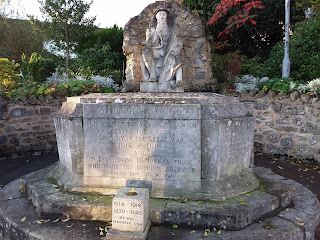Christmas is a time for traditions: the food, the music, the decorations (and complaining about how early they go up!), the parties, the church services and of course it wouldn't be Christmas without the cries of “It's all too commercialised!” We may lament that children are no longer content with Christmas presents consisting of shed-built wooden toys, an apple, an orange and some nuts, but I suspect that none of us would actually want it to be like that again. However it is true that in all the focus on the extravagance of presents or celebrations, the true reason for Christmas gets lost.
Nothing exemplifies this more than 'Black Friday'. Originally a term to describe the crowds of U.S. citizens starting their Christmas shopping on the day after Thanksgiving, it became an opportunity for retailers to offer big sales. This trend has recently (at least pre-pandemic) become more popular outside the U.S.A. and has been adopted by many retailers in this country. It's not just the consumerism of Black Friday that is a problem, but also the behaviour that it stirs up – there are often stories about injuries and even deaths caused by crowding and fighting over hugely discounted and desirable products. Fighting and injuries are also a feature of the other UK Black Friday – the nickname used by the emergency services for the Friday before Christmas due to its popularity as a night for Christmas parties. So, whether it's about presents or partying, for many people Christmas is defined by Black Friday.
Although Black Friday, in either use, is almost the opposite of the meaning of Christmas as a time of altruism and peace, it does show us why Christmas was necessary. Black Friday reminds us how as humans we can easily take something good, for example giving presents and celebrating with family and friends, and turn it into something bad. This is what the Christian faith calls 'Original Sin' – the innate tendency of humans to choose selfishness and our own interests over the interests of others, and to reject God's authority over us. Black Friday shows that Christmas is necessary because Christmas is defined not by Black Friday but by Good Friday.
The consequence of Original Sin is that we are unable, and ultimately unwilling, to do anything about our sinfulness and so we need a Saviour. This Saviour had to be human so that he could identify with us, suffer in our place and sympathize with us in our weakness. But he also had to be divine to pay off the infinite wrath of God incurred by our sin. In Psalm 51 King David acknowledged his sinfulness and asked God for forgiveness saying “wash me, and I will be whiter than snow” (verse 7). Christmas is the day we remember that Jesus was fully human and fully divine, being born so that he could die in order to pay the punishment for our sins on Good Friday and then rise from the dead at Easter to give us a new start.
So is your Christmas defined by Black Friday or Good Friday? Is it all about materialism, excess and self-centredness or is it about an awareness of your sin, and the celebration of the birth of your Saviour who will wash you whiter than snow?











